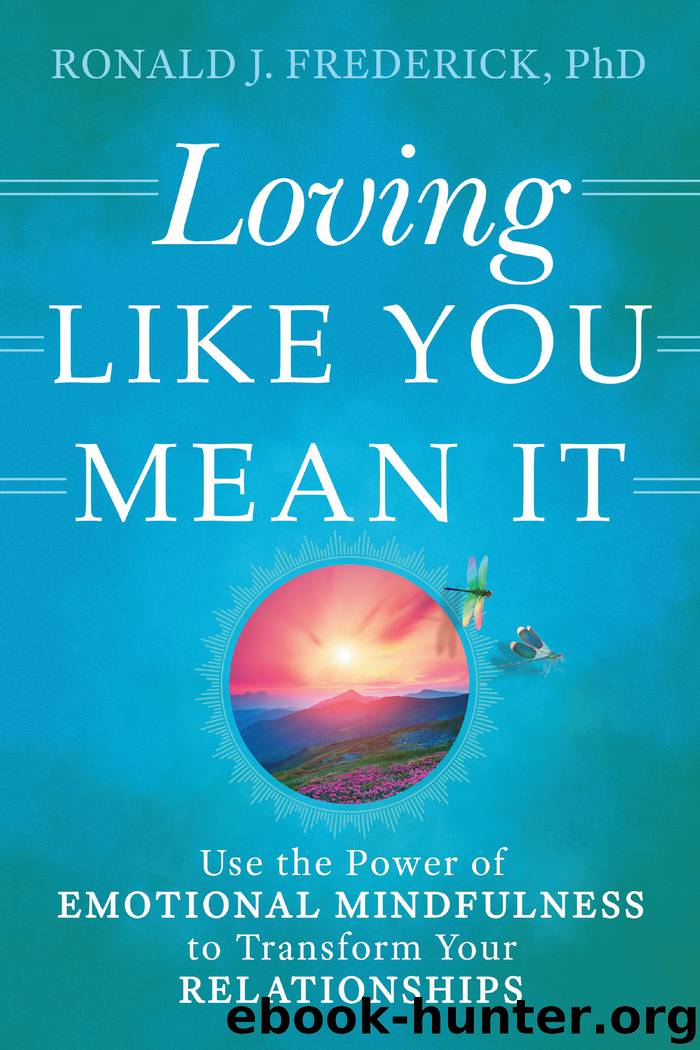Loving Like You Mean It by Ronald J. Frederick

Author:Ronald J. Frederick
Language: eng
Format: epub
Publisher: Central Recovery Press, LLC
Published: 2019-05-04T04:00:00+00:00
What was that like for you? Were you able to imagine being there for your younger self? If you were, how did that feel? Did it make a difference in your experience? Did it change how you feel inside?
Maybe you found it difficult to imagine engaging in the kind of caring that would have met your early needs. Maybe you found it hard to feel for your younger self. That’s actually not uncommon. Many people struggle with being able to feel compassion for their younger self. For that matter, many people struggle with feeling compassion for their adult selves as well. The sad truth is, if we weren’t cared for as children in ways that were sensitive and attuned, if we didn’t feel valued, respected, and loved, it’s hard for us to respond to ourselves in a caring way. We have no frame of reference to draw on, no internal working model for what self-compassion looks like. We lack an inner voice that tells us we’re okay, that we’ll be okay, that we’re worthwhile and lovable, and that we’re not alone. In short, it’s hard to imagine being this way if we’ve not experienced it. If we had, it would be an available internal resource for us, there for the taking.
In addition, our defenses can impede our attempts. We turn to look at our child-self and feel nothing, or worse we feel frustration, disgust, or contempt. Why, you may wonder? Well, some of us adapted to our early experiences in life by learning to blame or give ourselves and our feelings a hard time. As children we presumed or got the message that it was our fault if things weren’t going well with our caregivers, if we were not being attended to, or if we were treated poorly. So we figured that if we can get control over ourselves, if we can whip ourselves into shape, then things will be better with our parents. Things will change.
If this is true for you, perhaps you imagined and hoped that they’d treat you differently, that they’d be there for you in the ways you needed, that they’d love you. Maybe such a strategy worked to some degree. And maybe it helped you feel a modicum of security. Maybe it kept you from being overwhelmed by feelings of pain and sadness.
Trouble is, the strategy was likely built on a false assumption. It wasn’t your fault that your parents couldn’t meet your needs or treated you poorly. You weren’t responsible for their behavior. You were a child. Yet like other coping strategies that you developed early in life, it may persist. You may continue to be hard on yourself. You may continue to feel bad about yourself. You may continue to criticize and blame yourself. If that’s the case, no wonder it can be challenging to feel some self-compassion.
But that doesn’t mean you can’t develop it. After all, it’s innate to feel empathy and compassion. You were born with the capacity to do so. It’s what enables you to connect with others.
Download
This site does not store any files on its server. We only index and link to content provided by other sites. Please contact the content providers to delete copyright contents if any and email us, we'll remove relevant links or contents immediately.
| Codependency | Conflict Management |
| Dating | Divorce |
| Friendship | Interpersonal Relations |
| Love & Loss | Love & Romance |
| Marriage | Mate Seeking |
The 5 Love Languages: The Secret to Love That Lasts by Gary Chapman(9760)
Doing It: Let's Talk About Sex... by Hannah Witton(9266)
Should I Stay or Should I Go? by Ramani Durvasula(7639)
The Road Less Traveled by M. Scott Peck(7574)
The Lost Art of Listening by Michael P. Nichols(7476)
Daring Greatly by Brene Brown(6486)
Beartown by Fredrik Backman(5717)
We Need to Talk by Celeste Headlee(5596)
Men In Love by Nancy Friday(5218)
The Rules Do Not Apply by Ariel Levy(4935)
The State of Affairs by Esther Perel(4705)
How To Win Friends and Influence People by Dale Carnegie(4492)
Reflections Of A Man by Mr. Amari Soul(4266)
Pillow Thoughts by Courtney Peppernell(4262)
The Ethical Slut by Janet W. Hardy(4232)
Algedonic by r.h. Sin(4049)
Surrounded by Idiots by Thomas Erikson(3989)
He's Just Not That Into You by Greg Behrendt & Liz Tuccillo(3871)
I Love You But I Don't Trust You by Mira Kirshenbaum(3855)
